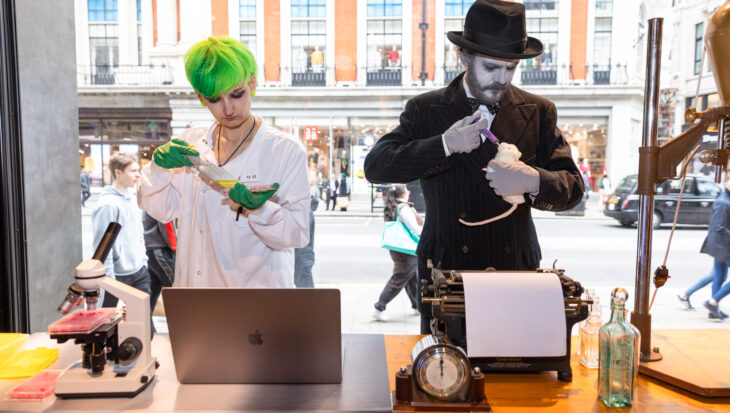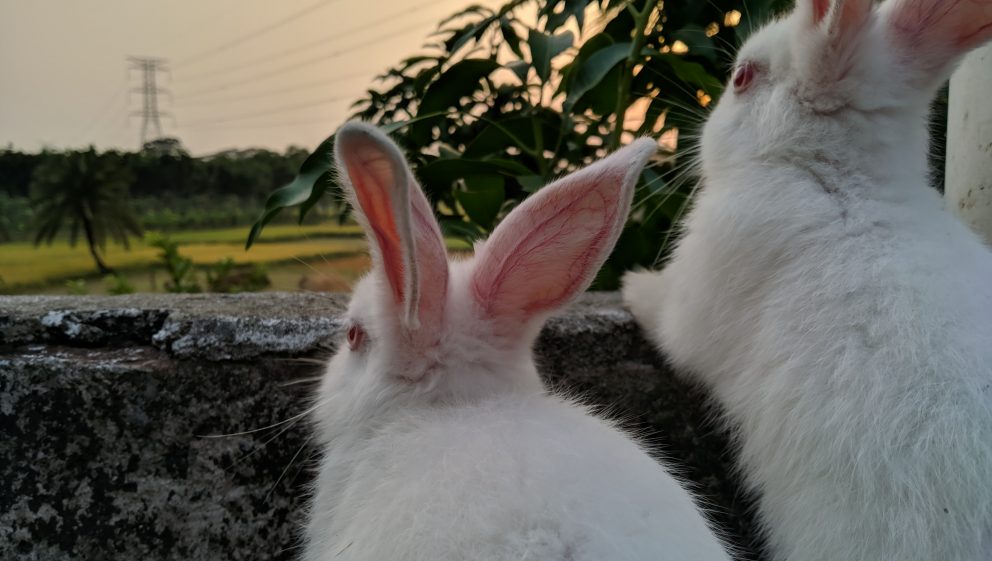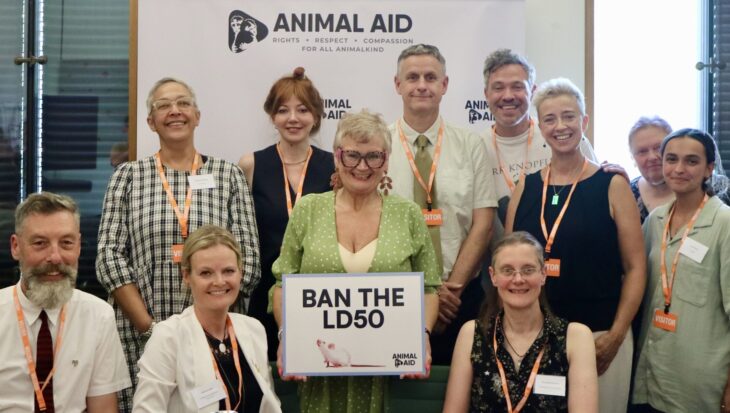Question 9. Is it wrong for animals to be killed for the sake of their fur?
Animal Aid suggest you write ‘Strongly agree’ to this question.
Question 10. What are your views on whether any of following methods are acceptable ways to produce fur products?
In this question, the term ‘assurance scheme’ refers to an industry-run scheme which sets standards for scheme members relating to how animals are kept, with scheme members being subject to industry-run inspections.
The answers are:
Strongly Agree – Agree – Neutral – Disagree – Strongly disagree – Don’t know
Animal Aid suggest you write ‘Strongly disagree’ to this question.
Animal Aid will answer that none of the above are acceptable. They are all immensely cruel, unnecessary and unethical.
Additional points you might want to include in your answer:
- A recent YouGov opinion poll commissioned by Humane Society International/UK as part of their #FurFreeBritain campaign, revealed that 93% of the British population reject wearing real animal fur, and the majority (72%) support a complete ban on the sale of fur in the UK.
- As domestic fur farming is banned, it logically follows that the import, production and sale of fur should also be banned, in line with this thinking. Otherwise, we are simply outsourcing cruelty.
- Fur can be produced domestically if it is a ‘by-product’ – this allows fur farming to continue happening in the UK, through a legal loophole. We need a complete fur ban, across all species and all purposes. We must tighten the legislation or it is meaningless.
You can then go into the specifics of why you personally feel it is cruel. Some points to consider:
- Fur farming involves confining animals in tiny barren cages, with little to stimulate their minds, such as meaningful enrichment, and provides little room for them to move.
- They may face the immense frustration. Behaviours that animals are very motivated to do – such as ranging long distances, hunting, digging or foraging for food are impossible. This causes them huge emotional distress. Mink, who are semi-aquatic and have an innate urge to swim and dive for food are denied any access to water. This can lead to huge frustration, distress and physical suffering. As a result of this, animals can display abnormal behaviours such as circling and pacing, gnawing at the cage bars, self-mutilation or even cannibalism or infanticide. These have been revealed extensively across a range of undercover investigations. Caged fur farming fails to meet animals most basic of needs.
- Animals may endure the stress of being kept in unnatural social groups. For example, mink are usually solitary, but may be typically housed with others leading to fighting, injuries, even death and cannibalism.
- Animals may be selectively bred to grow unnaturally large. Foxes are commonly seen with excessive folds of skin, in order to maximise fur production. This must be incredibly uncomfortable, impeding their movement, ability to see or even breath.
- Animals such as rabbits may be kept in wire cages stacked on top of each other. As a result, they can end up covered in faeces and urine falling through the bare wire from the cages above. This is hugely unsanitary.
- Welfare “assurance schemes” labels are meaningless. They still allow animals to be kept in barren cages and finally be killed by extremely brutal means, such as anal electrocution. You can read more about this issue here: https://www.furfreealliance.com/wp-content/uploads/2020/01/CertifiedCruel_FFA-Research-Report.pdf
- Animal Defenders International (ADI)revealed that ‘Three of the farms recently exposed in ADI´s Bloody Harvest – the real cost of fur investigation have been punished by the Finnish Fur Breeders´ Association (STKL), and have had their certification of responsible husbandry revoked.’
- Animals trapped overseas, in the wild, such as raccoons, coyotes or bobcats may suffer for days in steel-jaw leg or ‘gin’ traps, before they are killed by a trapper. They become increasingly weak through not being able to feed and continuing attempts to escape. Animals have been known chew off their own leg in their desperation to escape.
- Animals farmed for their fur may be killed through gassing or electrocution. Hugely painful and traumatic methods, which prioritise the value of the animals’ fur over their welfare.
In truth, trappers are mainly interested in manipulating wildlife populations for their own benefit. State wildlife agencies actively manage populations of furbearers to ensure that there are enough animals for trappers to kill, not to prevent biological overpopulation.
Removing wild animals from a particular ecological niche is likely to have two results: 1) increase reproduction by the remaining individuals; and 2) increase mobility of the animal population at large, as territories are emptied and re-occupied. Neither can be considered “good wildlife management.”
https://www.protectourwildlifevt.org/trapping-myths
It is vital to think of individual animals and how they live and die, when populations as a whole are being discussed.
Question 11. What is your attitude towards the import and/or sale and/or export of fur or fur products in GB?
Freeform box.
- This question presents a good opportunity to say whether you would ever buy real fur products and explain your attitude towards fur.
- You can comment on whether you have seen real fur being mis-sold as fake fur and how clear the labelling of the product was. Have you or someone you know ever inadvertently purchased fur?
- This question gives you a chance to call for a complete ban on the import, sale and production of new animal fur. You can also urge an end to the UK production of fur by trapping, hunting or by farming†, as well as urging for an export ban on all fur items produced as a ‘by-product’ in the UK.
†Animal Aid and others have been campaigning against the establishment and expansion of numerous rabbit meat and fur farms across the UK. Animal Aid investigators uncovered some appalling conditions at a site in Derbyshire, operated by T&D Rabbits. Rabbits remained confined alone in their hutches for many hours with no access to grass, over repeat visits by our investigators. Astoundingly, the fur and meat from these animals is marketed as ‘free-range’, many people would find the conditions in which these poor animals are kept, absolutely appalling. This is a largely unregulated industry which is clearly slipping below the radar
Please take the opportunity to urge for the closure of the legal loophole, which at present allows the domestic production of fur as a ‘by-product’ to meat. This makes it profitable to continue to farm animals, such as rabbits, for their fur and flesh. This is at odds with the UK becoming the first country in the world to ban fur farming, on moral grounds, nearly twenty years ago. The government harbours ambitions to be a “world leader in animal welfare”, so it is time for them to reflect their words in their deeds.
Question 12. Other than for clothing and apparel, what uses of fur should we be aware of?
Here you can give personal accounts of your experience with fur. What types of real fur items have you seen on market stalls and in shops?
Possible items might include: felt, crafting, toys for cats or dogs, hot water bottle covers, pom poms for knitted hats, bag charms, rugs, blankets, cushions, ornaments, teddy bears and lures for fly fishing.
Question 39. Please provide any other relevant evidence you would like to include to inform decisions on the GB fur trade.
To make sure we can view your response, please upload files in either a Word, Excel or PDF format. Please make sure your file is under 25MB
This is an open question where you can include any information that you have been unable to add for earlier questions. You can also link to any sources which will strengthen your commentary such as research articles:
You may like to comment on:
- The environmental impacts of fur from the unsustainable amounts of fuel used by trappers’ vehicles to cover miles checking traps, to animal waste run offs which may pollute rivers and the wider natural environment, to the use of toxic chemicals in fur production during tanning or dying. A cocktail of toxic and cancer-causing chemicals (such as chromium and formaldehyde) are used to preserve the fur and skin to stop it from rotting as would naturally occur.
- The loss of biodiversity ‘Historically, the fur trade has had a severe impact on biodiversity and is responsible for the depletion and even extinction of several furred species, including the sea mink.’ ‘Trapping poses a major threat to wildlife populations. The traps used to catch wild animals are notoriously indiscriminate and can result in non-target species, some of which may be classified as endangered or threatened, being caught, injured or killed. Trapping can therefore put additional pressure on populations of animals that are already fragile.’ From:
https://www.furfreealliance.com/impact-on-biodiversity/
- The heavy environmental footprint of fur farming as it requires land, water, feed, energy and other resource inputs. Farming of carnivorous species such as foxes, has a large environmental toll. Some European advertising standards committees, including the Advertising Standards Authority have ruled that advertising fur as environmentally friendly is “false and misleading.”
https://www.theguardian.com/media/2012/mar/21/eco-friendly-fur-ad-banned
- The disease risk of intensive fur farming operations. Around 17million mink across 200 fur farms in Denmark were killed because of their ability to catch and transmit covid-19. Infection in mink can lead to mutations of the spike-proteins which, if transmitted to human populations, could potentially risk undermining the efficacy of vital vaccines. https://www.furfreealliance.com/covid-19-on-mink-farms/
- Progressive, international moves to ban fur. On 9th June Israel became the first country to prohibit the sale and purchase of fur, except for religious and scientific research purposes. In 2019, California introduced a complete ban on fur sales. Many European countries, including Belgium, Croatia, the Netherlands, Norway, and Austria are moving towards full or partial bans.
- A chance to be world leading If the UK were to ban the import and sale of all fur (including that produced as a by-product to hunting, trapping or farming) with no exceptions. This would be a world first.
Thank you for taking the time to complete the call for evidence. Let’s hope that collectively we can help shut down this vile industry.


